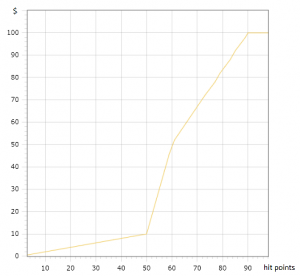Difference between revisions of "Market Value"
Jump to navigation
Jump to search
(Removing redundant section. Thats exactly what the equation above says, it just assumes a different unit. Work time in Seconds x 0.216 = Work Time in Ticks x 0.0036) |
|||
| (9 intermediate revisions by 3 users not shown) | |||
| Line 2: | Line 2: | ||
| round to five over = 200 | | round to five over = 200 | ||
| to string style = FloatTwo | | to string style = FloatTwo | ||
| − | | description = The market value of an object. The actual trade price will be | + | | description = The market value of an object. The actual trade price will be adjusted by [[Trade Price Improvement|negotiation skill]], relationship status, and other contextual factors.. |
}} | }} | ||
| + | [[File:Graph1.png|thumb|right|This graph shows dependence item sell price multiplier($) from item hit points. ]] | ||
If not explicitly specified, an item's market value defaults to a formula-determined value: | If not explicitly specified, an item's market value defaults to a formula-determined value: | ||
| Line 10: | Line 11: | ||
where | where | ||
| − | * ''I'' = combined market value of all ingredients | + | * ''I'' = combined market value of all ingredients |
* ''W'' = work to make the item as displayed in the item information window, assuming 100% work speed; the game gives this value as in-game seconds at normal speed (60 game ticks per second). Note: 1,000 units of work correspond to one in-game day of uninterrupted work. | * ''W'' = work to make the item as displayed in the item information window, assuming 100% work speed; the game gives this value as in-game seconds at normal speed (60 game ticks per second). Note: 1,000 units of work correspond to one in-game day of uninterrupted work. | ||
* ''Q'' = quality multiplier (see [[quality]]) | * ''Q'' = quality multiplier (see [[quality]]) | ||
| − | * ''H'' = health multiplier (only applies if the item has | + | * ''H'' = health multiplier (only applies if the item has [[Deterioration|deteriorated]] past a certain point). This only seems to apply to certain items - [[weapons]], [[apparel]] and [[artificial body parts]] decrease in value, while [[materials]], [[medicine]] and [[drugs]] do not. The exact determining factor of whether an item will will drop in value as it deteriorates is currently unknown. |
Items with a market value of above 200 will have their market value rounded to be divisible by 5, with a remainder of 2.5 being rounded down. Prices over $10 will be rounded to the nearest whole number. | Items with a market value of above 200 will have their market value rounded to be divisible by 5, with a remainder of 2.5 being rounded down. Prices over $10 will be rounded to the nearest whole number. | ||
| − | |||
| − | |||
==Version History== | ==Version History== | ||
*[[Version/1.1.2618|1.1.2618]] - Prices now only display decimals when under $10. | *[[Version/1.1.2618|1.1.2618]] - Prices now only display decimals when under $10. | ||
Revision as of 01:59, 18 May 2021
Market Value is a stat: The market value of an object. The actual trade price will be adjusted by negotiation skill, relationship status, and other contextual factors..
If not explicitly specified, an item's market value defaults to a formula-determined value:
M = (I + W × 0.216) × Q × H
where
- I = combined market value of all ingredients
- W = work to make the item as displayed in the item information window, assuming 100% work speed; the game gives this value as in-game seconds at normal speed (60 game ticks per second). Note: 1,000 units of work correspond to one in-game day of uninterrupted work.
- Q = quality multiplier (see quality)
- H = health multiplier (only applies if the item has deteriorated past a certain point). This only seems to apply to certain items - weapons, apparel and artificial body parts decrease in value, while materials, medicine and drugs do not. The exact determining factor of whether an item will will drop in value as it deteriorates is currently unknown.
Items with a market value of above 200 will have their market value rounded to be divisible by 5, with a remainder of 2.5 being rounded down. Prices over $10 will be rounded to the nearest whole number.
Version History
- 1.1.2618 - Prices now only display decimals when under $10.
